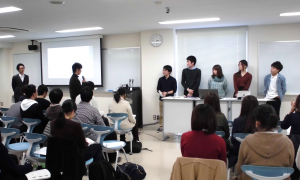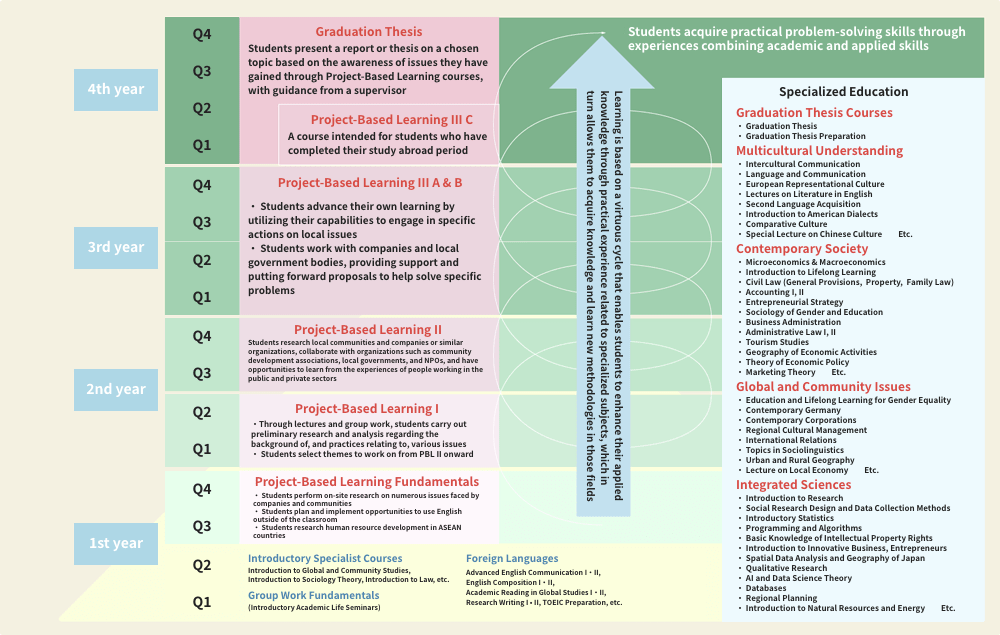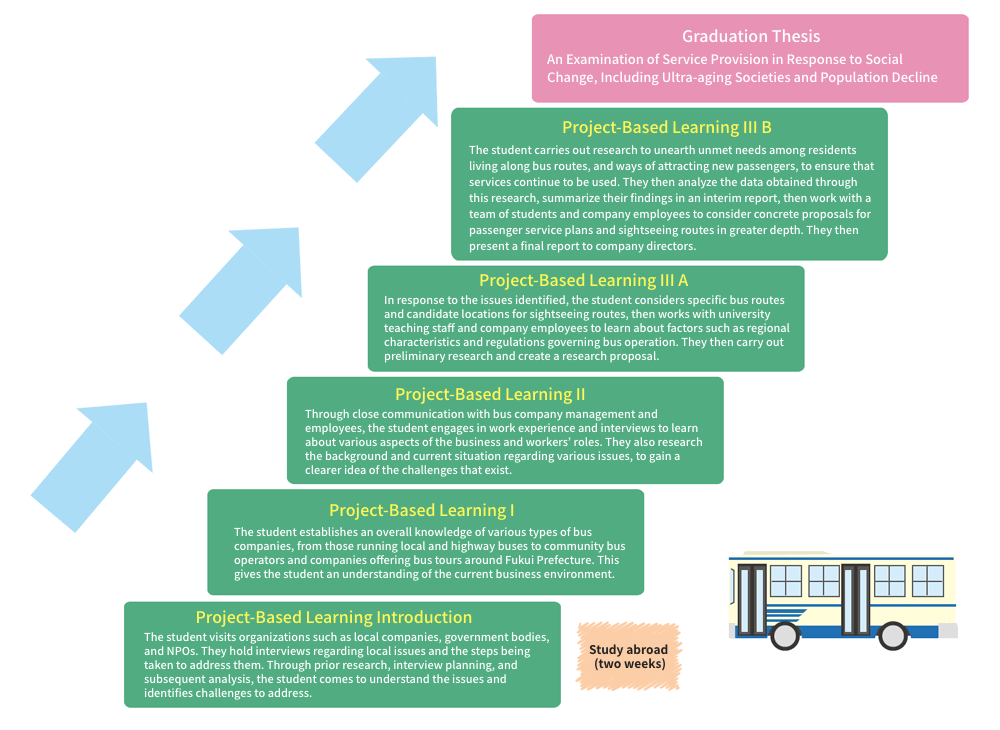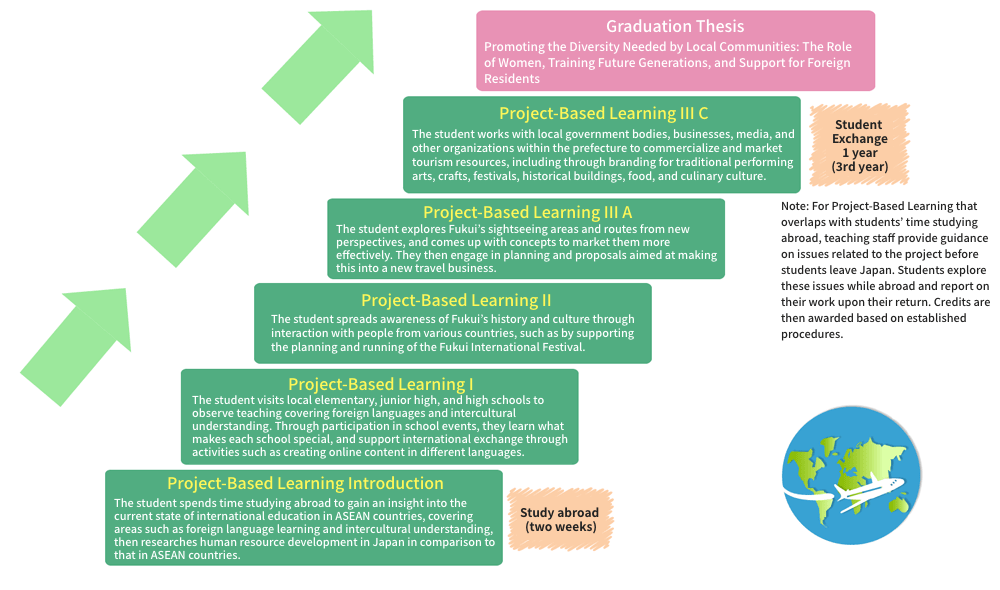Project-Based Learning
Learning Through Community-Centered Projects in Collaboration with the Private and Public Sectors
Project-Based Learning is a group of practical courses in which students travel to local businesses and government bodies with the aim of understanding, investigating, and addressing wide-ranging social issues.
Our curriculum seamlessly connects applied learning with the development of students’ ability to understand issues and perform analysis in various specialized fields.
During their first three years, students take part in projects with goals that grow in complexity in line with their academic progression. In students’ fourth year, they conduct research on themes covered in their previous projects, then write a thesis reporting their findings.
Our Project-Based-Learning-centered curriculum equips students with the ability to understand the real world as it is today while helping them to develop decision-making and critical thinking skills for pursuing and overcoming challenges. This enables students to chart a course for their own future and acquire the skills they need to reach their goals.
Connecting Project-Based Learning with Specialized Education
 Our approach creates a virtuous cycle by enabling students to enhance their applied knowledge through practical experience related to specialized subjects, which in turn allows them to acquire knowledge and learn new methodologies from those fields.
Our approach creates a virtuous cycle by enabling students to enhance their applied knowledge through practical experience related to specialized subjects, which in turn allows them to acquire knowledge and learn new methodologies from those fields.
Project Partners
Manufacturing Industry
- Luxottica (Fukui Megane Industry Co., Ltd.)
- Takipaper
- Kokuryu Sake Brewing Corporation
- Seiren Co., Ltd.
- Nicca Chemical Co., Ltd.
- Fukuvi Chemical Industry Co., Ltd.
- Maedakosen Co., Ltd.
- Etc.
Media
- The Fukui Shimbun Co., Ltd.
- FCTV Co., Ltd.
- Fukui Television Broadcasting Co., Ltd.
- Fukui Broadcasting Corporation
Wholesale and Retail
- Tassay Co., Ltd.
- Fukui Canon Business Machines Co., Ltd
- Fukui Co-operative Society
- Mitani Corporation
- Etc.
Finance and Insurance
- Fukui Office of the Shoko Chukin Bank, Ltd.
- Mitsui Sumitomo Insurance Company, Limited
- AXA General Insurance Company Limited
- The Fukui Bank, Ltd.
- Fukui Shinkin Bank
Transportation
- Fukui Railway Co., Ltd.
- Echizen Railway Co., Ltd.
- Keifuku Bus Co., Ltd.
Service Industry
- Eupsychia Co., Ltd.
- Ootsuya Corporation
- Member hotels and inns of the Awara Onsen Ryokan Cooperative Association
- Fukui Branch of Kinki Nippon Tourist Co., Ltd.
- Etc.
Other
- Ekimae Mall
- Fukui Branch of the Japan Automobile Federation (JAF)
- Asuwayama Kodomo Asobu Lab
- Kyoritsu Women’s University
- JC Network Service Co-op
- Fukui City Shakyo
- Fukui Prefectural Library
- Fukui Machidukuri Center
- Fukui International Association
- Machizukuri Fukui, Co., Ltd
- Etc.
Local Governments
- Fukui Prefecture
- Fukui City (Shinkansen and Fukui City Promotion Division, Agricultural Policy Planning Division, Citizen Collaboration/Volunteer Promotion Division, Women’s Participation Promotion Division, etc.)
- Ono City
- Katsuyama City (Commerce and Culture Division, etc.)
- Sabae City
- Awara City
- Echizen City
- Eiheiji Town
- Mihama Town (Community Development Promotion Division, etc.)
- Etc.
Partner Universities (Thailand)
- Assumption University of Thailand
- Kasetsart University
- Mahidol University
- Etc.
Overview of Project-Based Learning Courses
In Project-Based Learning Fundamentals, which is offered in the second semester of students’ first year, students form small teams. Each team travels to sites relating to various challenges being faced in the community, and visits workplaces such as businesses and local government bodies. Teams research sites in advance, plan and hold on-site interviews, and perform analysis after their visits, then hold debriefing sessions to contextualize students’ awareness and understanding of the issues.
Starting with Project-Based Learning I, which is offered in the first semester of students’ second year, several team projects are established within three project-based learning tracks. Students choose and participate in projects that align with their own interests, and can choose to continue the same project-based learning track throughout Project-Based Learning I, II, and III, or elect to follow a different track each year.
- The three project-based learning tracks are as follows:
| A. | Local Community and Industrial Promotion Students work in concert with staff from local businesses, governments, and community agencies to engage in resolving issues in areas such as the revitalization of urban centers and rural communities, and the development and marketing of products by local businesses. |
|---|---|
| B. | Cross-cultural Exchange Students work together with local schools, government bodies, and businesses to engage with various issues related to contact and exchange with multicultural societies, which is becoming ever more crucial in increasingly globalized communities. This includes sharing regional resources beyond national borders, and education to promote intercultural understanding in schools. |
| C. | Diversity Students work together with local governments and other related agencies towards solutions to issues connected to diversity in local communities. This includes challenges surrounding the active participation of women, the training of future generations, and support for foreign residents. |
Students are also able to engage in Project-Based Learning while studying abroad at their host institution.







